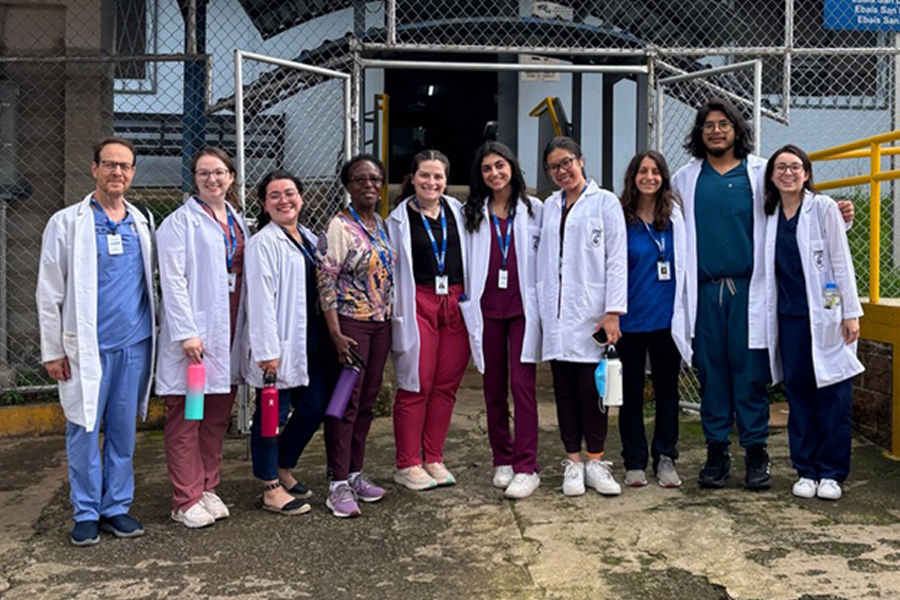Tech
Care in Costa Rica

Pictured: New York Tech nursing student Lauren Greenberg (third from right), her peers, Associate Professor Michael Gindi, M.D. (left), and Assistant Professor and Director of the Center for Global Health Lillian Niwagaba, Ph.D. (fourth from left), performed service work at Costa Rica’s clinic, Los Equipos Básicos de Atención Integral en Salud.
This summer, a group of students from the College of Osteopathic Medicine (NYITCOM) and School of Health Professions traveled to Costa Rica with Associate Professor Michael Gindi, M.D., and Assistant Professor and Director of the Center for Global Health Lillian Niwagaba, Ph.D., to learn about healthcare systems and provide meaningful and sustainable change to the Costa Rican communities they visited.
Aspiring nurse Lauren Greenberg was one of the students on the service trip; she shared with New York Tech News that those she met made an impression on her to last a lifetime.
The most rewarding part of the Costa Rica trip was sitting with the children in the neighborhood of Heredia. It made me nostalgic for summer camp and reading with my two-year-old nephew. Although it was a brief time shared with the children, there was a genuine sense of connection, and it was fascinating to interact with them.
During our time in Costa Rica, we observed many patients at a clinic called Los Equipos Básicos de Atención Integral en Salud (EBAIS). With my limited proficiency in Spanish and from what I was able to understand in conversations I heard, a patient’s wife was conversing with the doctor about his eating habits and revealed his love for pancakes and that he may not be truthful about his portion sizes. A challenge that pervades healthcare providers is that despite their ability to give counsel on dietary modifications, a patient may be stubborn, and navigating their adherence to detail is important. Another patient equated her pain to a gorilla on her shoulders, while another was grieving her father and struggling with her appetite. An especially memorable patient was an elderly man with Alzheimer’s disease. His daughter was wheeling him around, and his sense of humor was inspiring. These interactions, albeit only a glimpse, provided insight into the experiences of being in a patient setting and the lasting impressions that it left.
As an aspiring nurse, I hope to make patients comfortable and bring warmth and personality to their care. Despite my limited medical knowledge and language skills, I feel incredibly grateful and privileged to have had the opportunity to shadow doctors at EBAIS during hospital rounds and in a surgical setting. There is a certain degree of responsibility that comes with having a vast amount of knowledge, which is the beauty of medicine, all the while continuing to learn and be aware of and empathize with the influences of culture and the social determinants of health on patients’ healing processes.







![[!LIVE-FOOTBALL@!]+ Commanders vs Eagles Live Stream ! Atlanta Falcons vs New York Giants LIVE , player stats, standings, fantasy games TV channels and more HS8079 [!LIVE-FOOTBALL@!]+ Commanders vs Eagles Live Stream ! Atlanta Falcons vs New York Giants LIVE , player stats, standings, fantasy games TV channels and more HS8079](https://www.reddotdigitalit.com/wp-content/uploads/2021/05/Streaming-Platform.jpeg)


